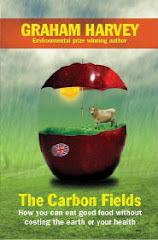The Observer piece is based on a new, best-selling American book called Secrets of Gorgeous: Hundreds of Ways to Live Well While Living It Up. In it the author – nutritionist Esther Blum - writes of the “disservice” the low-fat, fat-free culture has done to our bodies – particularly for women.
She says: “We have got ourselves to stage where we can’t comprehend that we need good fats to live a healthy life. We need fat to regulate our hormones. We need cholesterol to make oestrogen, progesterone and testosterone.

“We should be eating full-fat food… Saturated fats support bones, protect the liver, enhance the immune system, and absorb omega-3s. In moderation, they don’t cause heart disease but slow down the absorption of foods in your stomach making you feel fuller for longer.”
To which I say three cheers to Esther Blum. Readers of this column will know how we at GrassRoots Food feel about the low-fat, over-processed junk that’s all too often passed off as the healthy option. We’ve all been brainwashed into thinking that saturated fats and the foods containing them – foods that human beings have eaten since we emerged as a species – are somehow bad for you.
It must be about the most effective con-job ever perpetrated by food manufacturers on a gullible population. It’s good to know that in popular American culture the penny has finally dropped. We’ve all been duped.
There’s just one proviso to all this, and it’s an important one. Those healthy saturated fats will come principally from animal foods. And the way those animals are reared and grown is crucial.
Whether it’s meat or dairy foods we’re talking about, the healthiest fats come from animals raised on pasture; animals grazing fresh, herb-rich grass. This is how most animals were raised when I was a kid back in the 1950s. In Britain – the nation with some of the world’s best grasslands – it’s the system we need to return to.
You’re probably thinking this’ll mean more expensive, elitist niche foods. Far from it. Pasture-fed foods – though healthier – are generally cheaper to produce than conventional foods, particularly if we enter another period of high oil prices. Most of today’s foods require copious amounts of oil to produce. Grassland and its products are solar-powered.
If you want the story of why we desperately need a new full-fat culture – and how we can achieve it in a new austerity age – read my book The Carbon Fields. As it says in the ad: It could change the way you think about food.



